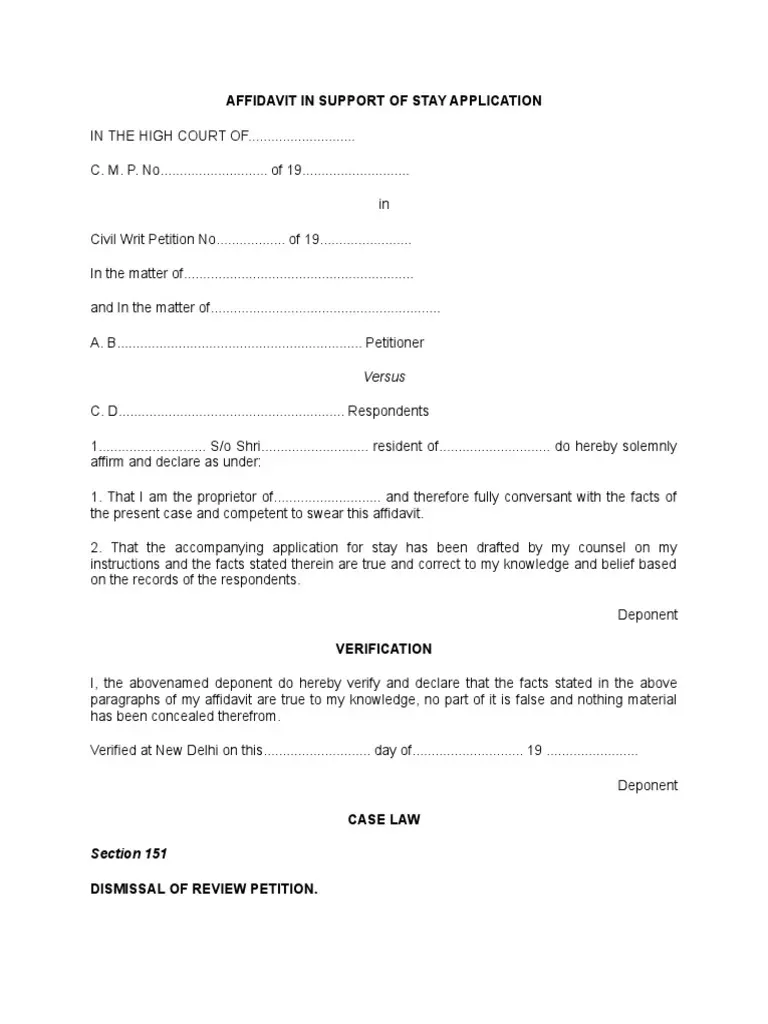Table of Contents
Quality Service Guarantee Or Painting Free

Get a rental agreement with doorstep delivery

Find the BEST deals and get unbelievable DISCOUNTS directly from builders!

5-Star rated painters, premium paints and services at the BEST PRICES!
Loved what you read? Share it with others!

How to Get a Stay Order in India: Step-by-Step Legal Process in 2025
Table of Contents
Curious about what a stay order is in India? Picture this: Three brothers file a case for property partition. Later, a stranger claims ownership of the same property. Now, there are two conflicting cases involving the same property and individuals. This is where a stay order steps in. A stay order from the court means that the partition case is suspended until the stranger's ownership claim is settled, preventing conflicting judgments. Stay orders can apply to various scenarios involving your property or assets. Our guide covers all you need to know to navigate this crucial legal concept and avoid future legal complications. Stay informed to protect your rights and assets.
Defining a Stay Order
A ‘stay’ or ‘stay order’ is defined as temporarily stopping or postponing any judicial proceeding through the court or legal authorities in India to secure a citizen's rights. It could lead to the suspension of a case or even the suspension of any specific proceeding within an ongoing case. In the case of any key development that may require it, a judge may decide to issue a stay order without even formally prompting the other party or making a request to them in this regard.
There are two types of stay orders – ‘stay of proceedings’ and ‘stay of execution’. A stay of proceedings, as mentioned in the scenario above, is issued by the court in case parallel proceedings take place, which may affect either one. A stay of execution refers to the complete halting of the enforcement of a verdict or judgment against someone, for example, when it is believed that a person is innocent and is given a pardon. This means that stay orders can persist conditionally or even absolutely.
Quality Service Guarantee Or Painting Free

Get a rental agreement with doorstep delivery

Find the BEST deals and get unbelievable DISCOUNTS directly from builders!

5-Star rated painters, premium paints and services at the BEST PRICES!
Let us now look at the different scenarios where a stay order may be applicable.
Types of Stay Orders in India
A stay order is a legal directive issued by a court to halt a judicial proceeding, action, or enforcement temporarily. There are different types of stay orders:
- Stay of proceedings: This type of stay halts ongoing legal proceedings, typically when a related matter is considered in a higher court or to prevent duplication of trials.
- Stay of execution: This is issued to pause the enforcement of a court judgment, such as stopping the transfer of property, demolition, or eviction until further notice.
- Stay of arrest: It is used to prevent the arrest. It is often awarded where the legality of the arrest may be questionable or during the pendency of anticipatory bail applications.
- Stay of government orders: A stay of the operation of government orders, rules, or actions is granted.
Procedure to Get a Stay Order in India
Obtaining a stay order in India is a legal remedy used to temporarily halt legal proceedings, execution of a judgment, arrest, or governmental actions, depending on the nature of the dispute. Here are the step-by-step procedures to get a stay in India:
- Approach the appropriate court depending on the nature of the case (civil, criminal, property-related, etc.), be it a Civil Court, Sessions Court, or High Court.
- Filing a petition for a stay order, clearly stating the facts of the case, the relief sought, and the urgency or harm that could result in the absence of such an order.
- Submit relevant documents for the court to consider the request. These may include ownership documents, a sale deed, property tax receipts, an FIR copy, a charge sheet, and identity proof.
- The applicant must establish the following three essential criteria before the court:
- The stay may cause irreversible harm or significantly complicate the legal proceedings if the stay is not granted.
- The application must be made without unreasonable delay.
- The appellant must provide security to ensure compliance with the case's eventual outcome.
- If the court finds the prima facie evidence convincing and the legal grounds justified, it may issue a stay order.
- If the stay order is not granted, the applicant can appeal to a higher court (e.g., from a District Court to a High Court or from a High Court to the Supreme Court).
Types of Stay Order Formats
There are several scenarios in which a stay order suit can be issued:
- In the case of a property in dispute is vulnerable to becoming damaged, wasted, or alienated by any party, or sold wrongfully due to the execution of the verdict
- In the case of the defendant threatening or intending to remove or even dispose of the property in dispute to defraud creditors
- In the case of the defendant threatening to cause harm to the plaintiff in relation to the property in dispute
Typically, you may have (or may in the future) come across these stay order procedures:
- Stay order on property: This is a temporary stay order on any property that has been/is being damaged, wasted, alienated, or wrongfully sold or that has been threatened to be disposed of.
- Stay order on land: Given India's vast agricultural land, a court-mandated stay order on land refers to a temporary halt on any use of the land. This is in the case that the land in dispute doesn’t have a determined owner, or any illegal practices have occurred on that land.
To file such a request for a stay order, you need to remember that the stay order process has a duration, along with the appropriate amount of legal counsel and mandatory court stay order fees.
For one, you must first establish prima facie, i.e., the legal claim that shows enough evidence to proceed with a legal trial or verdict on the case. You must meet the fundamental criteria for the case to happen in the first place. This is why you must prove the three things below:
- If the stay order is not issued, the appellant may face irreversible damage or make the judicial process complicated
- The stay order application has been made without any unnecessary delay (so that the intent is incidental in relation to the dispute)
- That appellant has given security enough for the case to come to a verdict, and will consider it binding
If the abovementioned proofs prove correct, the court may grant a stay order. Suppose the existing court doesn’t grant the stay order. In that case, you can also appeal to an even higher court, for instance, getting a supreme court judgement on a stay order due to an illegal overtaking of a property.
Stay Application Under CPC Format
Here is a standard format for a Stay Application under the Civil Procedure Code (CPC):

Registering a Court Stay Order
If you are wondering how to get a stay order from the court in the case of a dispute over your property’s rightful ownership, worry not. You can simply approach the court with the FIR (First Information Report), a copy of the charge sheet, the proper documents of the property, your ID proof, along all the documents you consider are relevant to the case. As for the time required for the process to complete, a high court stay order validity after issuance can take anywhere from 7 to 21 days, all depending on how quickly the prima facie satisfies the court, and how strong your case is presented to the court. Nevertheless, a stay order may not be granted for a duration greater than 6 months.
Do note that in some cases the high court may not interfere such as the ones falling under the SARFAESI Act (Securitization and Reconstruction of Financial Assets and Enforcement of Security) introduced in 2002 to help Indian banks and lenders recover their dues (say, in case a borrower is not able to pay his or her home loan dues for a long period of time and allows the lender to recover the collateral asset). Read more about the SARFAESI Act here.
In the Haryana and Punjab High Courts, for example, it was recently made clear the courts cannot hinder the recovery proceedings once they have been initiated. It means you may not be able to take a stay order against the SARFAESI act. Alternatively, you can seek remedy by approaching the Debt Recovery Tribunal.
What Happens After a Stay Order is Violated?
A stay order is a legal order meant to curb activities regarding disputed land, property, etc. However, legal action can be taken if any party is observed to violate the stay order, that is, continuing activities such as construction, sale, etc.
You can launch a civil contempt lawsuit against the contravenor in the High Court if the court has previously issued a stay order and it is not implemented. You should file a police complaint, advise them of the court orders, and ask them to make sure they are obeyed before you file a contempt suit with the High Court.
Getting The Right Legal Counsel Matters a Great Deal!
The several facets of a case can be quite complex and navigating the Indian legal system can be complicated for a layman. This is why seeking the counsel of a good property or real-estate lawyer can help prevent unfair verdicts where you may actually have a strong case. Moreover, getting all the documentation correct with the help of a lawyer helps minimize the chances of refusal at the court where you are requesting a stay order.
Finally, having an experienced lawyer who has dealt with such cases helps you avoid any common mistakes. Your dream home, after all, must not come with unnecessary legal and financial issues that you may end up living with for a long time.
You must be extremely careful about legal issues and paperwork; even the slightest mistake could mean a considerable loss. The best way to avoid such errors is to get a team of professionals to assist you. At NoBroker, our experts can guide you and ensure your paperwork is perfect.
Frequently Asked Questions
Ans. A court stay order means stopping or postponing a judicial case to protect the rights of either of the appealing or defendant parties.
Ans. You need to present the FIR, a copy of the charge sheet, the proper property documents, ID proof, and all relevant documents. To be safe, you should take the expert service of a property lawyer to know more about how to get a stay order on the property.
Ans. It is possible to remove stay order from a property in dispute by filing a petition to cancel the stay order and proving the necessary requirements. To be safe, you should take the expert service of a property lawyer to know more about how to remove a stay order on a property.
Ans. You can file a complaint with the necessary proof to the municipal authorities and your local police station. The court may even grant a temporary injunction for the act to be restrained until a verdict is reached.
Ans. Yes, a stay order can be cancelled by filing a petition for cancellation along with the necessary proof explaining the grounds for cancellation.
Ans. Parties involved must not take any action related to the case unless permitted by the court. Any hearings, evidence recording, or execution of judgment is suspended temporarily.
Ans. When a court issues a stay order, it means the court has temporarily stopped a legal process, action, or implementation of a judgment.
Ans. The time limit for appealing a district court decision is 90 days.
Ans. An interim stay order is a temporary legal order issued by a court to freeze or delay certain actions until a more formal hearing or decision can be made.
Recommended Reading

Franking Charges Explained: Meaning and Benefits
January 31, 2025
1116864+ views

Rectification Deed Format and Process in India 2025
June 1, 2025
135831+ views

Revenue Stamp in India: Meaning, Types, Uses, Legal Value & Where to Buy in 2025
January 31, 2025
131934+ views

How to Get a Stay Order in India: Step-by-Step Legal Process in 2025
May 31, 2025
96652+ views

FSI in Mumbai 2025: Calculate FSI in Mumbai Municipal Corporation
January 31, 2025
94640+ views
Loved what you read? Share it with others!
Most Viewed Articles

Franking Charges Explained: Meaning and Benefits
January 31, 2025
1116864+ views

Society Maintenance Charges : Meaning, Cost, Types and Calculation
January 31, 2025
200727+ views

BBMP E-Khata Registration process for property owners in Bangalore, Karnataka in 2025
March 19, 2025
145603+ views

Daughter's Right in Fathers' Property - the Law is Finally Equal for both Genders?
June 1, 2025
145397+ views

Rectification Deed Format and Process in India 2025
June 1, 2025
135831+ views
Recent blogs in
What Is Cidco Lease Deed: Types, Tenure, Rights and Responsibilities in India 2026
February 20, 2026 by Ananth
Perpetual Lease Deed: Meaning, Rights, Benefits and Registration Process in India 2026
February 20, 2026 by Vivek Mishra
Ground Lease Vs Land Lease: Meaning, Key Features and Legal Distinctions in 2026
February 20, 2026 by Vivek Mishra
Lease Extension Agreement: Required Documents, Cost and Registration in India 2026
February 20, 2026 by Ananth









 Full RM + FRM support
Full RM + FRM support
Join the conversation!